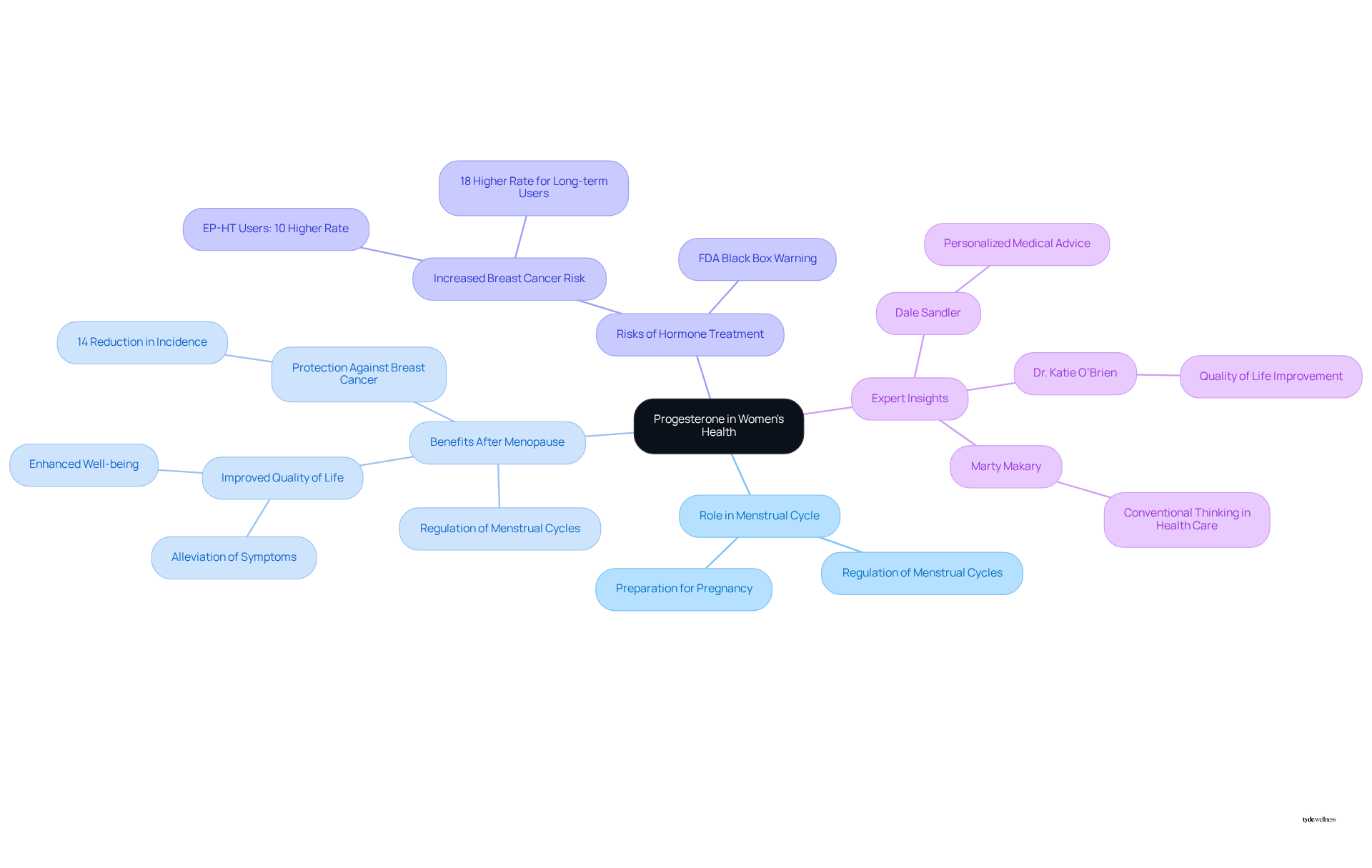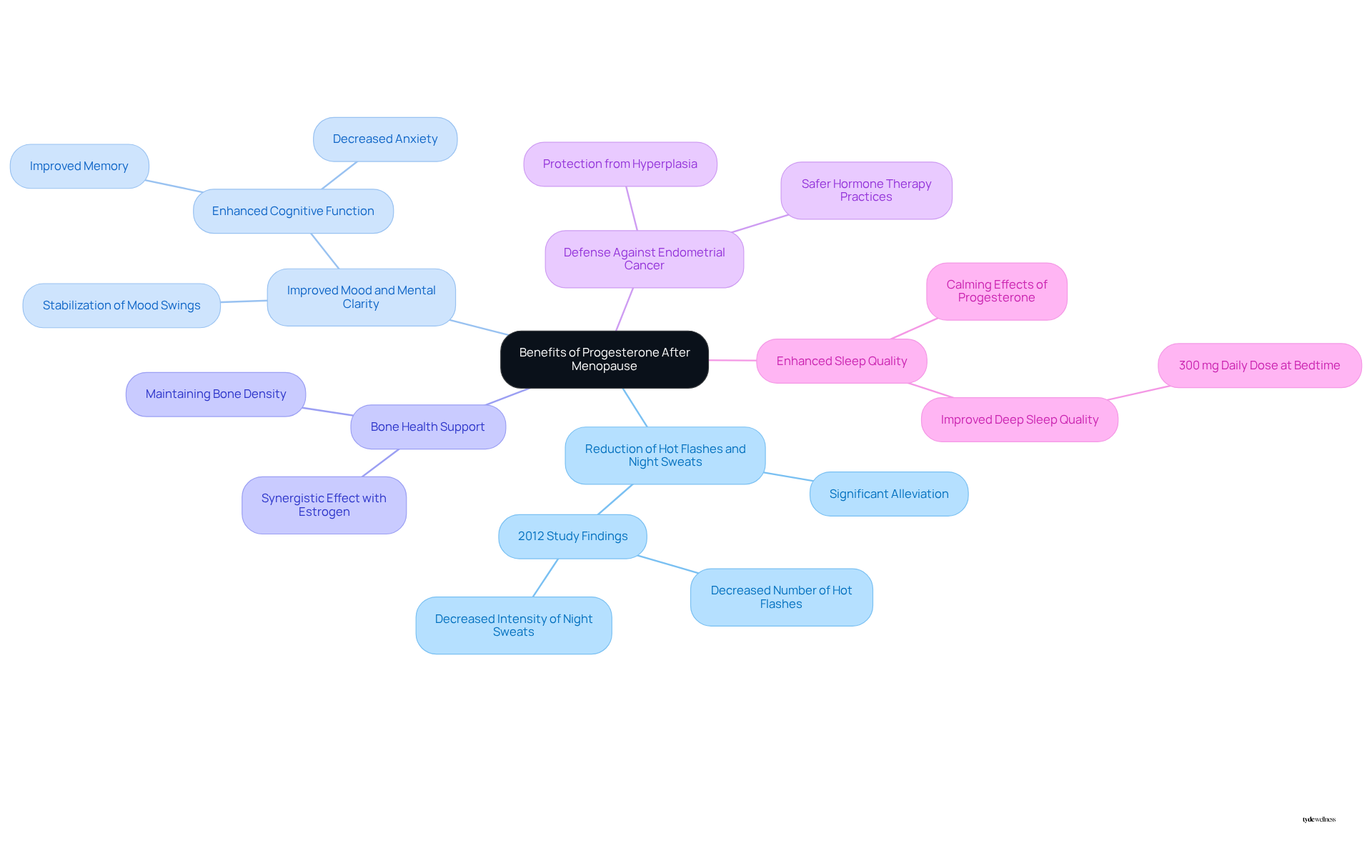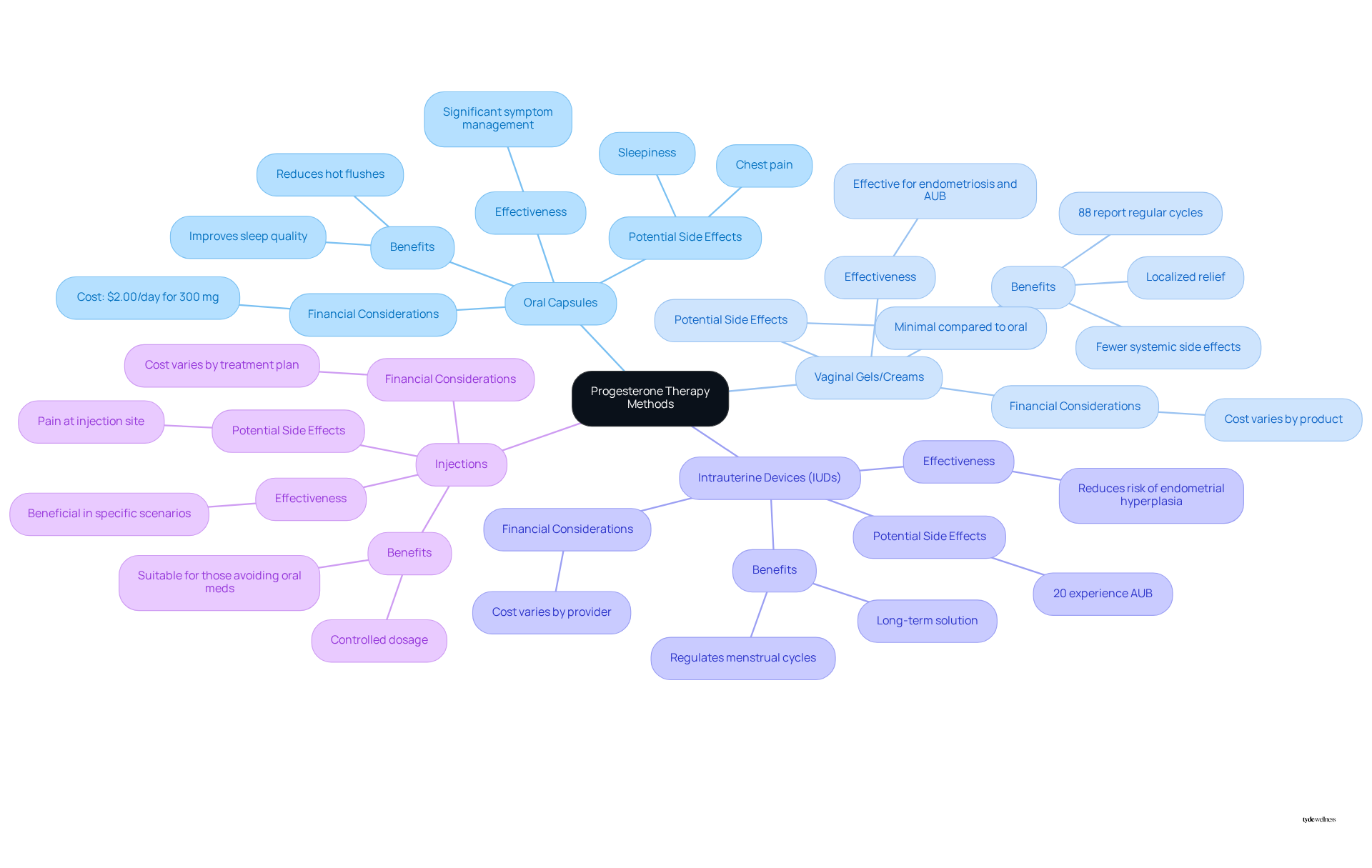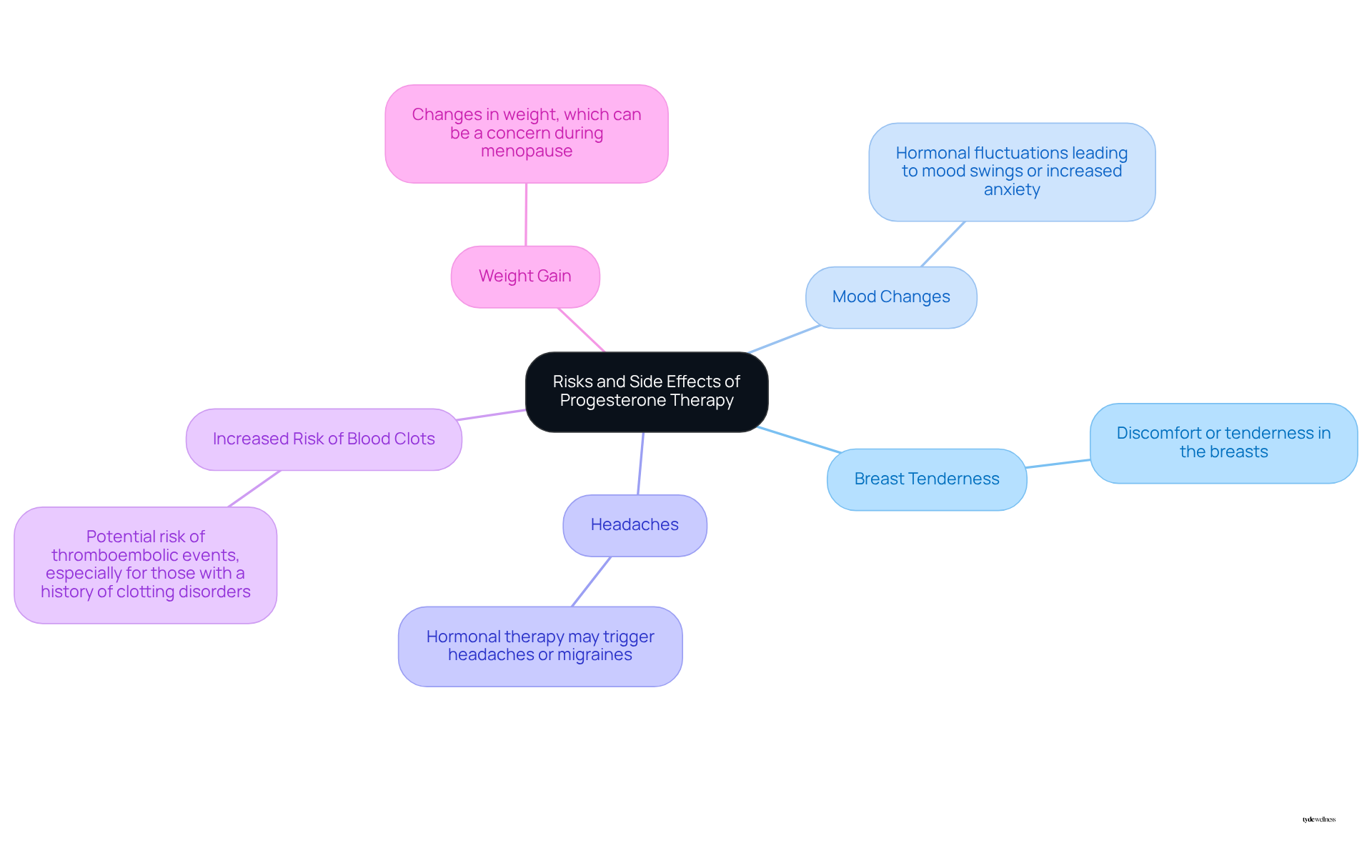Overview
The benefits of progesterone after menopause encompass alleviating menopausal symptoms such as hot flashes, mood swings, and sleep disturbances. Additionally, it supports overall health by improving bone density and reducing cancer risks. This article emphasizes these advantages by citing studies that demonstrate significant improvements in the quality of life for women undergoing hormone therapy. It highlights the importance of hormonal balance in effectively managing post-menopausal health.
Introduction
Understanding the complexities of hormonal changes during menopause is essential for women’s health, particularly as the body experiences a significant decline in progesterone levels. This hormone is vital for various bodily functions and becomes increasingly important for managing menopausal symptoms while maintaining overall well-being.
As women navigate this transitional phase, a pertinent question arises: how can progesterone therapy enhance quality of life and mitigate the challenges posed by menopause?
Exploring the benefits of progesterone after menopause reveals not only its potential to alleviate discomfort but also its role in promoting long-term health.
Explore the Role of Progesterone in Women’s Health
Progesterone is an essential substance in female health, primarily produced in the ovaries. It plays a crucial role in regulating the menstrual cycle, preparing the uterus for potential pregnancy, and maintaining the early stages of pregnancy. After menopause, levels of this hormone decrease significantly, leading to various symptoms such as hot flashes, mood swings, and sleep disturbances. Understanding its function helps women recognize the importance of hormonal balance and the benefits of progesterone after menopause in alleviating menopausal symptoms.
Gynecologists emphasize the benefits of progesterone after menopause, stating that maintaining adequate progesterone levels is vital for overall health. Dr. Katie O’Brien, a primary author at NIH’s National Institute of Environmental Health Sciences, states, “Treatment can significantly enhance the quality of life for individuals experiencing intense menopausal symptoms or those who have had surgeries impacting their endocrine levels.” A recent study examining data from over 459,000 individuals under 55 across North America, Europe, Asia, and Australia indicated that hormone treatment can significantly improve quality of life for those facing severe menopausal symptoms. Moreover, the protective effects of hormone therapy, particularly unopposed estrogen hormone therapy (E-HT), have been noted, with users experiencing a 14% reduction in breast cancer incidence compared to non-users. It is important to note that E-HT is recommended only for individuals who have had a hysterectomy due to uterine cancer risk.
The role of this hormone extends beyond symptom management; it is also linked to menstrual cycle regulation and overall hormonal balance. For instance, a case study demonstrated that women undergoing hormone treatment reported improved regulation of their menstrual cycles, which is essential for those transitioning through menopause. Therefore, understanding the benefits of progesterone after menopause is crucial for making informed decisions regarding treatment options for female health. Furthermore, while hormone treatment can provide benefits, it is vital to consider the potential risks associated with estrogen plus progestin hormone treatment (EP-HT), which may involve an increased risk of breast cancer. This balanced perspective is essential for women navigating their health during this transitional phase.

Identify the Benefits of Progesterone After Menopause
After menopause, progesterone therapy offers a variety of significant benefits, including:
-
Reduction of Hot Flashes and Night Sweats: Regular intake of progesterone has been shown to significantly alleviate these common menopausal symptoms. A 2012 study found that daily oral hormone treatment decreased both the number and intensity of hot flashes and night sweats, leading to improved comfort and enhanced sleep quality.
-
Improved Mood and Mental Clarity: The benefits of progesterone after menopause include its crucial role in stabilizing mood swings and enhancing cognitive function, which can often be affected during this transitional period. Numerous women report enhanced memory and cognitive clarity following the initiation of hormone treatment, contributing to decreased anxiety and mood stabilization.
-
Bone Health Support: The benefits of progesterone after menopause include its synergistic effect with estrogen to help maintain bone density, thereby reducing the risk of osteoporosis. This is particularly significant for postmenopausal individuals, as the reduction in estrogen levels can result in increased bone fragility.
-
Defense Against Endometrial Cancer: For women receiving estrogen treatment, the inclusion of progestin is essential. It helps protect the uterine lining from hyperplasia, a condition that can lead to endometrial cancer, thereby promoting safer hormone therapy practices.
-
Enhanced Sleep Quality: Known for its calming effects, this hormone can improve sleep patterns disrupted by menopause. Studies have indicated that a daily intake of 300 milligrams of this hormone taken at bedtime can enhance the quality of deep sleep, lessening the intensity of night sweats that frequently disrupt rest.
While hormone treatment provides numerous advantages, it is important to recognize that some women may experience side effects such as fatigue, mild headaches, and breast tenderness. Consulting with a healthcare provider can help customize the treatment to individual needs and ensure optimal results.
These benefits of progesterone after menopause underscore the importance of considering hormone treatment as a viable option for managing menopausal symptoms and improving overall quality of life.

Implement Progesterone in Hormone Therapy: Methods and Considerations
When considering progesterone therapy, various administration methods are available, each providing distinct benefits of progesterone after menopause.
-
Oral Capsules are commonly prescribed and taken daily, effectively managing menopausal symptoms. Research suggests that oral hormones can significantly reduce hot flushes and improve sleep quality, making this a beneficial choice for many women. However, potential side effects, such as sleepiness, should be taken into account.
-
Vaginal Gels or Creams are applied directly and provide localized relief, often resulting in fewer systemic side effects. Intravaginal delivery is particularly effective due to its proximity to reproductive tissues, enhancing treatment outcomes for conditions like endometriosis and abnormal uterine bleeding (AUB). A study revealed that 88% of women reported a regular menstrual cycle after using vaginal hormones.
-
Intrauterine Devices (IUDs) release progesterone directly into the uterus, offering a long-term solution for individuals who prefer not to take daily medication. This method can also help regulate menstrual cycles and reduce the risk of endometrial hyperplasia. Notably, 20% of women experience AUB, highlighting the importance of this treatment option.
-
Injections allow for progesterone to be administered via injection, which may be suitable for women who have difficulty with oral medications. This method provides a controlled dosage and can be beneficial in specific clinical scenarios that highlight the benefits of progesterone after menopause.
Before starting hormone treatment, it is essential to consult with a healthcare provider. Discussing individual health history, potential interactions with other medications, and the most suitable administration method is crucial for optimizing treatment outcomes. The cost of Prometrium® is approximately $2.00 a day for the 300-mg dose, an important financial consideration. Regular monitoring and adjustments may be necessary to ensure the treatment remains effective and safe.

Evaluate the Risks and Side Effects of Progesterone Therapy
While progesterone therapy can offer significant benefits, it is crucial to recognize the potential risks and side effects, which may include:
- Breast Tenderness: Some women may experience discomfort or tenderness in the breasts.
- Mood Changes: Hormonal fluctuations can lead to mood swings or increased anxiety in certain individuals.
- Headaches: Hormonal therapy may trigger headaches or migraines in those who are susceptible.
- Increased Risk of Blood Clots: There exists a potential risk of thromboembolic events, particularly for individuals with a history of clotting disorders.
- Weight Gain: Some women may notice changes in weight, which can be a concern during menopause.
It is essential to discuss these risks with a healthcare provider to assess the appropriateness of progesterone therapy based on individual health profiles and to monitor for any adverse effects during treatment.

Conclusion
Understanding the significance of progesterone after menopause is crucial for women navigating this transitional phase of life. As levels of this vital hormone decline, many experience a range of uncomfortable symptoms. Recognizing the potential benefits of progesterone therapy can empower women to make informed decisions about their health and well-being.
The article highlights several key advantages of progesterone after menopause, including:
- Reduction of hot flashes
- Improved mood and mental clarity
- Enhanced bone health
- Better sleep quality
Furthermore, it emphasizes the importance of consulting healthcare providers to tailor treatment plans that address individual needs and mitigate potential risks associated with hormone therapy.
Ultimately, the insights provided underscore the necessity of considering progesterone therapy as a viable option for managing menopausal symptoms and enhancing overall quality of life. Women are encouraged to explore these options and engage in discussions with their healthcare providers to ensure a comprehensive approach to their health during and after menopause.
Frequently Asked Questions
What is the primary role of progesterone in women’s health?
Progesterone is essential for regulating the menstrual cycle, preparing the uterus for potential pregnancy, and maintaining the early stages of pregnancy.
How does progesterone levels change after menopause?
After menopause, progesterone levels decrease significantly, which can lead to symptoms such as hot flashes, mood swings, and sleep disturbances.
Why is maintaining adequate progesterone levels important after menopause?
Maintaining adequate progesterone levels is vital for overall health and can help alleviate menopausal symptoms, improving the quality of life for individuals experiencing intense symptoms.
What did a recent study find regarding hormone treatment for menopausal symptoms?
A study involving over 459,000 individuals under 55 found that hormone treatment can significantly improve the quality of life for those facing severe menopausal symptoms.
What are the protective effects of unopposed estrogen hormone therapy (E-HT)?
Users of E-HT have experienced a 14% reduction in breast cancer incidence compared to non-users, although it is recommended only for individuals who have had a hysterectomy due to uterine cancer risk.
How does hormone treatment affect menstrual cycle regulation?
Women undergoing hormone treatment reported improved regulation of their menstrual cycles, which is important for those transitioning through menopause.
What should women consider regarding estrogen plus progestin hormone treatment (EP-HT)?
While hormone treatment can provide benefits, women should be aware of the potential risks associated with EP-HT, which may include an increased risk of breast cancer.
List of Sources
- Explore the Role of Progesterone in Women’s Health
- Certain type of hormone therapy increases breast cancer risk, study finds (https://cbsnews.com/news/hormone-therapy-breast-cancer-risk-study)
- Black box warning on menopause hormone therapies should be removed, experts say | CNN (https://cnn.com/2025/07/24/health/menopause-hormone-treatment-wellness)
- Breast cancer risk in younger women may be influenced by hormone therapy (https://nih.gov/news-events/news-releases/breast-cancer-risk-younger-women-may-be-influenced-hormone-therapy)
- Can hormone therapy improve heart health in menopausal women? | Penn State University (https://psu.edu/news/research/story/can-hormone-therapy-improve-heart-health-menopausal-women)
- FDA commissioner stirs debate over hormone therapy for menopause (https://thehill.com/policy/healthcare/5412519-hormone-therapy-black-box-warning)
- Identify the Benefits of Progesterone After Menopause
- Benefits of Progesterone for Menopause (https://familymedicineaustin.com/benefits-of-progesterone-after-menopause)
- The Hidden Hero of Menopause: Understanding Progesterone’s Power | Florida Center for Hormones & Wellness (https://hormonesandwellness.com/the-hidden-hero-of-menopause-understanding-progesterones-power)
- Progesterone for Menopause Symptoms: Benefits and Side Effects (https://healthline.com/health/progesterone-for-menopause)
- Benefits of Taking Progesterone After Menopause – Everlywell Blog | At-Home Health & Wellness Insights (https://everlywell.com/blog/womens-health/benefits-of-progesterone-after-menopause?srsltid=AfmBOooitbgBvlIJB523Z0f9lh6Iy-Pxukt8TUeVV7EiRhFGNeuL2HPQ)
- Hormones for menopause are safe, study finds. Here’s what changed (https://npr.org/sections/health-shots/2024/05/01/1248525256/hormones-menopause-hormone-therapy-hot-flashes)
- Implement Progesterone in Hormone Therapy: Methods and Considerations
- Beyond Infertility: Progesterone for Menopause, PCOS, and Endometriosis | Calla Lily Clinical Care (https://callali.ly/en-gb/news/2025-02-13/beyond-infertility-progesterone-for-menopause-pcos-and-endometriosis)
- Pills, Patches, Creams or Sprays? How to Choose a Hormone Therapy Delivery Mode (https://news.cuanschutz.edu/news-stories/youve-decided-to-try-hormone-therapy.-now-how-would-you-like-that-delivered)
- Why Intravaginal Progesterone Therapy is a Smart Choice and a Smart Investment | Calla Lily Clinical Care (https://callali.ly/ko-kr/news/2025-01-14/why-intravaginal-progesterone-therapy-is-a-smart-choice-and-a-smart-investment)
- Progesterone Therapy for Menopause – CeMCOR (https://cemcor.ubc.ca/resources/progesterone-therapy-menopause)
- Progesterone supplementation during IVF patient education fact sheet (https://reproductivefacts.org/news-and-publications/fact-sheets-and-infographics/progesterone-supplementation-during-ivf)
- Evaluate the Risks and Side Effects of Progesterone Therapy
- Certain type of hormone therapy increases breast cancer risk, study finds (https://cbsnews.com/news/hormone-therapy-breast-cancer-risk-study)
- Get the Facts About Menopause & Hormone Therapy (https://nyulangone.org/news/get-facts-about-menopause-hormone-therapy)
- Black box warning on menopause hormone therapies should be removed, experts say | CNN (https://cnn.com/2025/07/24/health/menopause-hormone-treatment-wellness)
- Is Hormone Replacement Therapy Safe? Pros and Cons of HRT (https://cancercenter.com/community/blog/2024/09/is-hormone-replacement-therapy-safe)
- FDA commissioner stirs debate over hormone therapy for menopause (https://thehill.com/policy/healthcare/5412519-hormone-therapy-black-box-warning)


